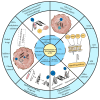Research progress of DNA methylation in colorectal cancer (Review)
- PMID: 38963030
- PMCID: PMC11240861
- DOI: 10.3892/mmr.2024.13278
Research progress of DNA methylation in colorectal cancer (Review)
Abstract
DNA methylation is one of the earliest and most significant epigenetic mechanisms discovered. DNA methylation refers, in general, to the addition of a methyl group to a specific base in the DNA sequence under the catalysis of DNA methyltransferase, with S‑adenosine methionine as the methyl donor, via covalent bonding and chemical modifications. DNA methylation is an important factor in inducing cancer. There are different types of DNA methylation, and methylation at different sites plays different roles. It is well known that the progression of colorectal cancer (CRC) is affected by the methylation of key genes. The present review did not only discuss the potential relationship between DNA methylation and CRC but also discussed how DNA methylation affects the development of CRC by affecting key genes. Furthermore, the clinical significance of DNA methylation in CRC was highlighted, including that of the therapeutic targets and biomarkers of methylation; and the importance of DNA methylation inhibitors was discussed as a novel strategy for treatment of CRC. The present review did not only focus upon the latest research findings, but earlier reviews were also cited as references to older literature.
Keywords: CRC; DNA methylation; biomarker; therapeutic target.
Conflict of interest statement
The authors declare that they have no competing interests.
Figures


References
-
- Araghi M, Soerjomataram I, Bardot A, Ferlay J, Cabasag CJ, Morrison DS, De P, Tervonen H, Walsh PM, Bucher O, et al. Changes in colorectal cancer incidence in seven high-income countries: A population-based study. Lancet Gastroenterol Hepatol. 2019;4:511–518. doi: 10.1016/S2468-1253(19)30147-5. - DOI - PMC - PubMed
Publication types
MeSH terms
Substances
LinkOut - more resources
Full Text Sources
Medical

